“And now you shall not see me.” John 16: 16.
Humanly speaking, these are strange words. Who could ever imagine that the sacred presence of our Lord Jesus Christ could ever be injurious to his disciples? And yet he says expressly, I am going away from you, and you will not see me any more; “but I tell you the truth; it is expedient to you that I go;” it is better for you not to see me any more. “If I go not,” added our Lord, “the Paraclete will not come to you.” The consolation you have in my presence is only a sensible one; this must be taken away from you, if you wish to receive the consolation and grace of the Holy Ghost. Now, if the consoling presence of our Lord on earth was incompatible with the presence by grace of the Holy Ghost, how, then, can that grace abide with willful, carnal glances at vanities, earthly beauties, or dangerous objects? Oh, certainly, a necessary means of guarding the heart and keeping it in the grace of God is watchfulness over our outward senses, especially the eyes. Hence,
I. He who allows his eyes to wander about curiously on all sides will not long remain free from sin; and
II. In order to persevere in grace, we must all keep custody over our eyes,
I. Amongst all the outward senses there is none from which we can better judge the state of the soul, as to whether it is healthy or not, than from the eyes. “The fornication of a woman shall be known by the haughtiness of her eyes, and by her eye-lids;” (and the same is to be understood of men); therefore, “take heed of the impudence of her eyes” (Ecclus. 26: 12, 54). It is a rare and unusual occurrence for the fire of lust not to be ignited, when the eyes are allowed to rest needlessly and with satisfaction, on a person of the other sex. Bad thoughts are so many treacherous letters which the enemy of our souls sends to our hearts, to stir up impure images therein, and to persuade us to give up our souls to him. The spies who bring those letters are generally the eyes. “Death is come up through our windows” (Jerem. 9: 21). The look is followed by the thought, the thought by pleasure, and pleasure by consent.
It is an undoubted truth, discovered even by besotted heathens, that the eyes first lead to impure love; therefore Seleucus, a pagan legislator, commanded that, as a first punishment for adulterers, their eyes should be plucked out, because, as he said, that part should first suffer which was the first cause of the crime. The Holy Scripture often alludes to and condemns the eyes alone, as the chief cause of sin. Thus God, by the prophet Ezechiel, speaking of idolaters, declares: “I have broken their heart, that was faithless and revolted from me, and their eyes, that went a whoring after their idols” (Ezech. 6: 7). In the same way he reproaches, not the envious themselves, but their eyes: “The eye of the envious is wicked” (Ecclus. 14: 8). He calls, not the avaricious, but their eyes, insatiable: “The eye of the covetous man is insatiable in his portion of iniquity he will not be satisfied till he consume his own soul, drying it up” (Ibid. 9). In a word, in order that we may avoid all transgressions of the law, God warns us to mortify our eyes: “Let every man cast away the scandals of his eyes” (Ezech. 20:7).
Do you intend to avoid sin, and to keep on the right road to heaven? If so, what about your eyes? Do you allow them to wander about unhindered? Do you give them full liberty to gaze on everything that presents itself to them? Do you permit them to look with deliberate curiosity persons of the opposite sex, and to take pleasure in such looks? Do you wish to see and to be seen? Alas! if so, I venture to prophesy, no matter how innocent, pious, and firm may be your present good resolutions, your piety will not last long. You will not have a chaste heart, if your eyes are not modest. In a short time, you will be forced to sigh forth, with the prophet Jeremias: “My eye hath wasted my soul!” (Lament. 5: 51.) My soul was once rich in the treasures of divine grace which it had arduously collected. Alas! one curious look has robbed me of all those riches, “I saw and was lost,” you will have to acknowledge with the poet. In the morning, I confessed my sins with the firm resolution rather to die a thousand times than again offend my God. Yet, on the very same day, I looked on a dangerous object, and stained my conscience by a new sin: “I saw and was lost.” After hearing that sermon on the eternal truths, I thought heaven and earth would perish before I would consent to offend my God again; but, alas one imprudent glance has made me forget my resolution: “I saw, and was lost.” I went into the church in a state of innocence, to hear holy Mass, and to beg many graces from God, but I came away laden with mortal sin, the result of a single lustful glance at another’s beauty. “I saw, and was lost.” “Lust,” says St, Thomas of Aquin, “can hardly be avoided, unless its beginning, namely looking at a woman’s beauty, be avoided.” Therefore, the Holy Ghost warns us: “Look not upon a woman, lest thou fall into her snares: gaze not upon a maiden, lest her beauty be a stumbling block to thee; look not round about thee in the ways of the city, nor wander up and down in the streets thereof: turn away thy face from a woman dressed up, and gaze not upon another’s beauty” (Ecclus. 9: 3, 5, 7, 8).
“What?” Some will say: “must we, then, go about like blind men? Why has my Creator given me eyes, if not that I may use them? And what harm, is it for me to look at what pleases me?
I answer: Your Creator has given you ears to hear; are you, therefore, allowed to hear anything you please? He has given you a tongue to speak; can you therefore say whatever you like? He has given you hands to stretch forth, but not to take everything you please. And yet you are not obliged to go about deaf, dumb, or lame. Truly, you have eyes to see with, but not to look at everything you please. Otherwise, the Holy Ghost would not warn you so often to keep from gazing at another’s beauty; yet you are not forced on that account to go about like a blind man. “What harm is therein it?” you ask. And I ask you: What harm is it for a little child to take a sharp knife in its hand? And yet you do not allow him to keep it. Why? He has not yet cut himself with it. “That may be,” you reply; “but it is very dangerous, and he might hurt himself with it.” Seeing in itself is not sinful; but take care lest it be the beginning of sin.
What harm was it for Eve to look at the forbidden fruit in paradise? And yet, that one look brought death to her and to us all. Ah! Said Eve, let me look at it! Do not be afraid I will only admire the fruit. I will not stretch forth my hand to pluck it. I am not forbidden to look, but only to eat. Alas, if Eve had not looked, she would not have eaten, and she and all of us would not have lost paradise! Eating followed seeing, and the sin was consummated. What harm was it for the wife of Putiphar to look at her servant Joseph? Yet when she did so, shame, honor, and conjugal fidelity were cast to the winds. What harm was it for David that holy king, to look out through the windows of his palace at Bethsabee? And yet, if he had not done so, he would not have become an adulterer and a murderer. What harm was it for Ammon to look at his own sister? And yet those looks of his led him into incest. But what need is there of further proof? Often enough in our own days, we hear converted sinners giving expression to this heartfelt wish: “Ah! Would that I had never seen that person; I would not have fallen into sin!”
Therefore, keep the windows closed, if you do not wish to be robbed of your greatest treasure! Guard your eyes carefully, if you really wish to persevere in the friendship of God! If an angel had foretold to our first mother in paradise what would follow if she looked at the forbidden fruit, would she have been so incautious as not to have mortified her eyes? If the prophet Nathan had said to David when the latter opened the window of his palace, and was about to look out into his garden: “O David, what are you about to do? It would be better for you to fall down and break your neck than give that one unguarded look! You will forget your God, you will become a murderer and an adulterer, your favorite child will die ; dishonor will come upon your house, your son Absalom will drive you from your throne and persecute you until he dies on a tree in the state of sin and is lost forever; you will be made a laughing-stock to your own subjects, who will vilify and throw stones at you like a hunted dog, and all this will be as a punishment for your sin!” If such a dreadful announcement had been made to that then pious king, would he have been so foolish as still to have gratified his curiosity? That is not likely. And yet, one incautious glance, without his foreseeing any harm, or having the least bad intention, brought all that evil on him.
Dissolute young man! Vain girl! Weak mortals! I am neither a prophet, nor an angel; yet, I warn you that if you do not learn to keep your eyes always in check; if you give them full liberty to gaze at everything that offers itself to them; if you cast them freely on persons of the opposite sex; if you mix unrestrainedly in all kinds of company, you may be assured that it will soon be all up with your purity of heart. You will be guilty of murder and incest, if not in reality, at least in inclination and desire. Some of you will be tormented, day and night, by the spirit of impure love, which will give you no rest; some will seek opportunities, and consume the best years of their lives in impurity; some will be addicted to that vice till their old age, nay, till their death some will perhaps indulge in it publicly, before the whole town, And then, hear what follows: “Thus saith the Lord: If any man violate the temple of God, him shall God destroy. For the temple of God is holy, which you are.”
II. If curiosity of the eyes is to be avoided with regard to dangerous objects, or persons, it is even more necessary with regard to dangerous reading. Just as there is nothing more useful for us if we wish to persevere in good, and to become more devout, than the reading of spiritual books, so also there is nothing more injurious, especially to holy purity, than the reading of books that treat of unchaste subjects and impure love. This is an accursed invention of the devil, with which he endeavors to infect hearts, as with a pestilence. His attacks in this way are directed chiefly against the young, whom he tries to bewitch, and to lead a-stray; nor is he hardly ever disappointed. If he can but induce a person to read a bad book through curiosity, he is tolerably sure of his soul. Alas, he scatters those abominable books abroad in all places, at all times, by wicked agents. Are not we poor mortals already versed enough, by our own corruption in this filthy knowledge, without being taught it by these agents of the devil? The crafty tempter well knows that with the ordinary run of good Christians be can do little by openly immoral books. Such books would rather disgust than attract them. In order then to ensnare their souls, he places before their eyes amusing comedies, well-written romances, sensational love-stories, full of passion, which are in reality more dangerous to soul, the more cunningly they conceal the filth they contain the more they are able to amuse, and the more eager they make the reader to know the end of the story; for they fill the heart and mind with violent and unruly desires and softly fan the flames of impure passion, feeding it and keeping it alive. Eternal truths, which should and ought to lead us to heaven, are often explained in sermons, and are sometimes listened to with pleasure! But, alas, how soon are they lost sight of! Hardly is the sermon over, when they are forgotten! But these love stories and romances generally so captivate the imagination and the memory of young people, that sometimes they are never forgotten. But, one may say: There is nothing wrong in those books, Father I read them only for the sake of the style,—for the skill shown in developing the plot. A fine excuse, indeed! You must be a great admirer of elegant language! There are enough Lives of the Saints and like spiritual books published (good specimens even of a better style, and filled with still more wonderful and true incidents), which elevate the mind and heart to heaven and heavenly things, and teach us how to a-mend our lives. Why do you not read those books with the same pleasure and eagerness? They are not mere fictions, which betray your understanding; they are true, and can instruct you not only in the beauties of style, but also in the duties of a Christian life. Ah I tell the truth, do you not slight those good books because their contents do not gratify your sensuality? And even if those romances and love tales were better written, should you not be more anxious about the purity of your soul than about the elegance of your style? More careful to live well, than to speak well? To be learned in the school of Christ, than in that of the demon of impurity?
Do you wish to act as a good Christian? Then pitch those filthy books at once into the fire, as an agreeable burnt-offering to God. Better for you to do that, than for one soul to be cast by them into the fire of hell.
“Woe to the man by whom the scandal cometh!” I must cry out here, in the threatening words of God to all those who give to others occasion of sin, by placing bad books in their way, or by allowing them to look at indecent statues or bad pictures, or by not observing the rules of modesty in their own dress; for all those things are so many snares to catch souls and to betray them into the clutches of the devil. Theologians teach that a woman (and the same is to be understood of a man) who knows for certain that she is the object of an impure affection commits a mortal sin if, without necessity or reasonable cause, she puts herself deliberately in the way of being seen by that person, although she has no intention or wish to excite an impure passion in him. Now, if the law of Christian charity binds every one, to avoid giving others such an occasion of sin, even when clad with a due regard to modesty, how shall they answer to God for their actions, who deliberately place in the way of others objects that, of their nature, are apt to incite them to sinful thoughts and desires ? All the sins others commit through his instrumentality will be recorded against him, although he may not have had the deliberate wish or intention to lead others into sin.
I might here give vent to a bitter complaint against those careless parents, who allow their innocent little children to see things that would be unlawful amongst unmarried people. Let no one tell me that the children are too young, and that they do not understand. Granted that they do not understand it now, are not the impressions of such things imprinted on their imaginations and memories, so that they will never be eradicated? If you have not another room in your house for your children, it were better to let them go and stay in the pig-sty, than see what could be an occasion of scandal to them, and ruin their precious souls. There are parents who toil and moil from morning till night, while their daughters do nothing but deck themselves out in the latest fashions, and let themselves be seen. Parents, watch over your children more carefully! Fish are never safe, unless when in water. If they leave their own element, they die in a short time. Never are your daughters safer that at home, under your own eyes, and occupied with some work befitting their condition. The goods exposed constantly in the shop windows are either damaged, or are in a fair way to become so. No matter how pious, devout, and innocent your daughters may be, if they are fond of seeing and being seen, although they may not do anything wrong outwardly, yet they will have wickedness enough in their hearts. When young maidens begin to go about too freely, they soon lose their virtue, as their hearts become sullied with sinful thoughts and desires.
Christian parents, I beseech of you, listen to the warning of holy Writ: “On a daughter that turneth not away herself, set a strict watch; lest, finding an opportunity, she abuse herself” (Ecclus. 26: 53). Father, look after your son! Mother, watch over your daughter, and keep her constantly at work at home: “Take heed of the impudence of her eyes, and wonder not if she slight thee” (Ibid. 14). If you let her have too much of her own way, you must not be surprised to find her dead to all shame in the end.
And know, that the Lord will require her soul at your hands. Christians, of whatever condition, sex, or age you may be, guard your eyes from all curious and vain glances, if you wish to persevere in the grace and service of God. Alas! In what fragile vases we carry about the precious treasure of sanctifying grace! Our own carnal desires of themselves are always dragging us down into sin, and we are often forced to complain of our weakness and evil inclinations. Why, then, should we open the doors and windows to further temptations? Say to yourselves, each one of you: Have a little patience, O my eyes! Restrain yourselves for a short time! The beauty of creatures is not worth your consideration! In a little while, I will give you pleasure enough in heaven, where you may gaze forever on the infinite loveliness of God, on Jesus Christ, the most beautiful of the children of men, on Mary, the beautiful Spouse of the Holy Ghost, and on all the glories of the elect of God ! Reserve your curiosity till then I beg of you. Amen.
Source: The Penitent Christian, Imprimatur 1889

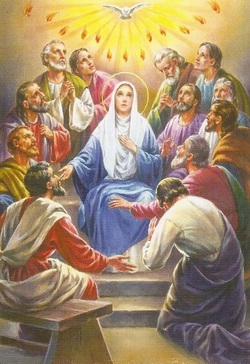
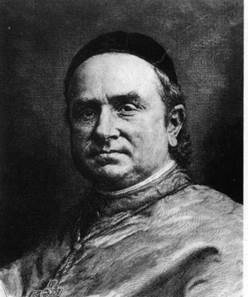
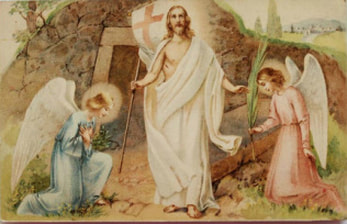
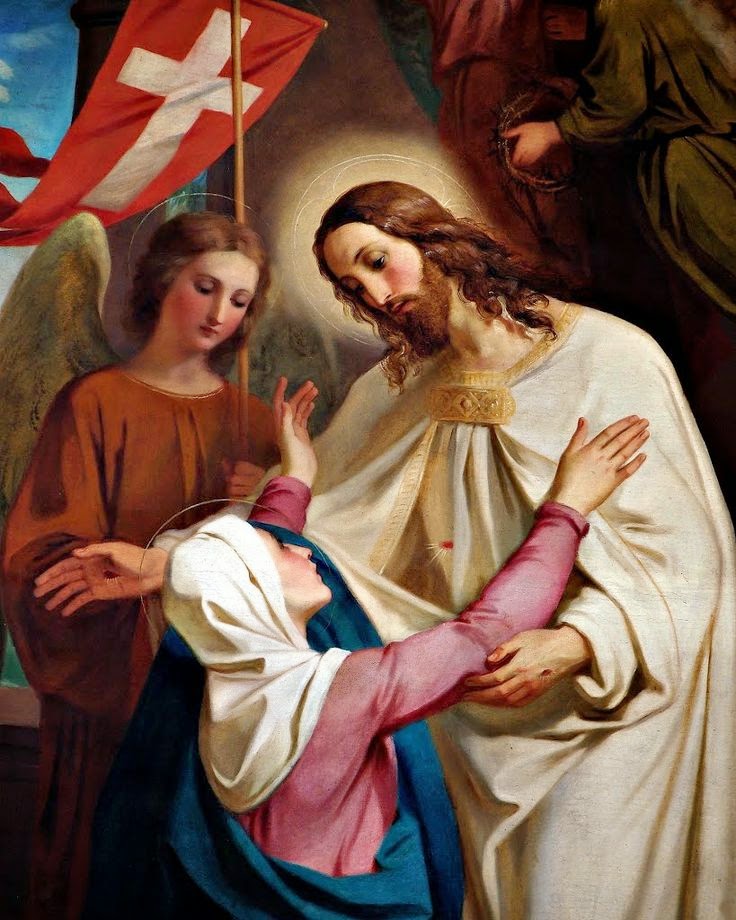
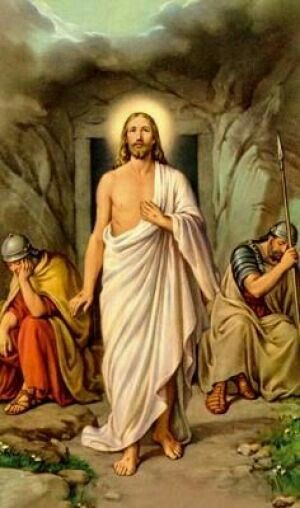
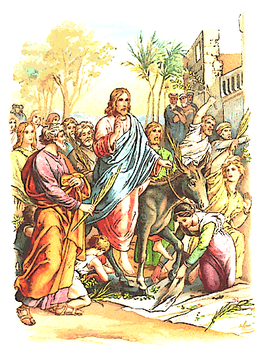
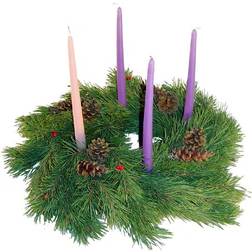
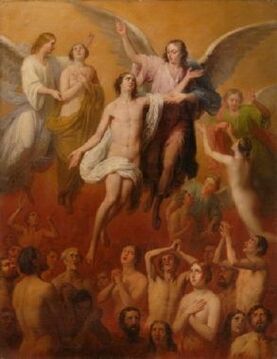
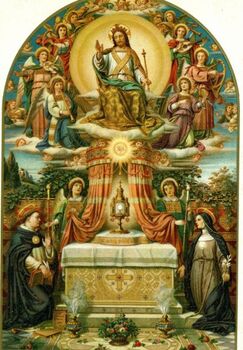
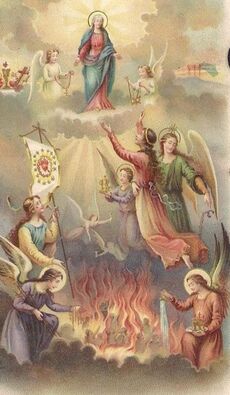
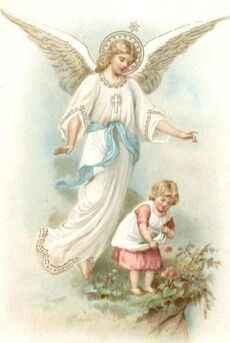


 RSS Feed
RSS Feed